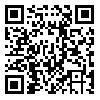Volume 28 - Supplementary
IBJ 2024, 28 - Supplementary: 388-388 |
Back to browse issues page
Download citation:
BibTeX | RIS | EndNote | Medlars | ProCite | Reference Manager | RefWorks
Send citation to:



BibTeX | RIS | EndNote | Medlars | ProCite | Reference Manager | RefWorks
Send citation to:
Nakhodaeezadeh M, Raeesi Dehkordi F, Zaree S. Impact of Social Support on Resilience and the Mental Health of the Frontline Healthcare Workers in Shahrekord During the COVID-19 Pandemic in 2021. IBJ 2024; 28 :388-388
URL: http://ibj.pasteur.ac.ir/article-1-4825-en.html
URL: http://ibj.pasteur.ac.ir/article-1-4825-en.html
Abstract:
Introduction: Studying the impact of social support on resilience and mental health among frontline healthcare workers (HCWs) can help us develop psychological intervention strategies for HCWs. This study aimed to evaluate the impact of social support on resilience and the mental health of the frontline HCWs in Shahrekord during the COVID-19 pandemic in 2021.
Methods and Materials: A cross-sectional (descriptive-analytical) study was conducted in 2021 on 286 frontline HCWs of Shahrekord University of Medical Science. Sampling was conducted using a random method (random cluster). Demographic questionnaire, general health questionnaire, Connor and Davidson Resilience Questionnaire, and the Norwegian Social Support Questionnaire were used. Research data was analyzed using SPSS-23 statistical software, descriptive statistics, and chi-square, Mann-Whitney, Kruskal-Wallis, and Spearman correlation coefficient tests.
Results: Results showed that the mean total score of resilience and general health were 67.18 ± 15.42 and 25.16 ± 9.95, respectively. Several supporters (p = 0.001), marital status (p = 0.025), functional support (p = 0.012), structural support (p = 0.004), and general health (p = 0.001) had a significant relationship with resilience. There was a significant association between overall general health and resilience (r = 0.25; p = 0.001). Also, there was a significantly positive relationship between emotional support (r = 0.11; p = 0.015) and structural support (r = 0.13; p = 0.020).
Conclusion and Discussion: There is a correlation between resilience and social support and the mental health of frontline HCWs. Health policymakers should pay attention to and respond to the mental health problems of frontline HCWs in the context of public health emergencies. Also, it is recommended that appropriate educational programs be designed and implemented during pandemics and quarantine periods to increase resilience and public health.

Methods and Materials: A cross-sectional (descriptive-analytical) study was conducted in 2021 on 286 frontline HCWs of Shahrekord University of Medical Science. Sampling was conducted using a random method (random cluster). Demographic questionnaire, general health questionnaire, Connor and Davidson Resilience Questionnaire, and the Norwegian Social Support Questionnaire were used. Research data was analyzed using SPSS-23 statistical software, descriptive statistics, and chi-square, Mann-Whitney, Kruskal-Wallis, and Spearman correlation coefficient tests.
Results: Results showed that the mean total score of resilience and general health were 67.18 ± 15.42 and 25.16 ± 9.95, respectively. Several supporters (p = 0.001), marital status (p = 0.025), functional support (p = 0.012), structural support (p = 0.004), and general health (p = 0.001) had a significant relationship with resilience. There was a significant association between overall general health and resilience (r = 0.25; p = 0.001). Also, there was a significantly positive relationship between emotional support (r = 0.11; p = 0.015) and structural support (r = 0.13; p = 0.020).
Conclusion and Discussion: There is a correlation between resilience and social support and the mental health of frontline HCWs. Health policymakers should pay attention to and respond to the mental health problems of frontline HCWs in the context of public health emergencies. Also, it is recommended that appropriate educational programs be designed and implemented during pandemics and quarantine periods to increase resilience and public health.

| Rights and permissions | |
 |
This work is licensed under a Creative Commons Attribution-NonCommercial 4.0 International License. |







.png)
